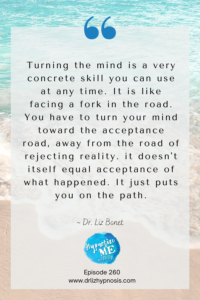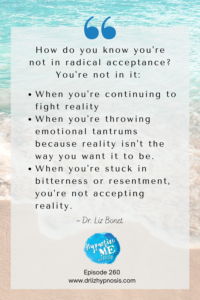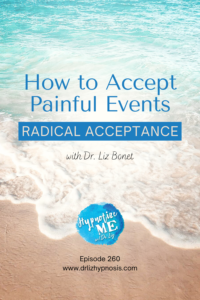Painful events and feelings are some of the hardest things for people to handle. Without acceptance, they can cause bitterness, deep sadness, resentment, and suffering. Dr. Liz talks about ways to accept painful events, move out of suffering, and take steps towards healing.
 |  |
About Dr. Liz
Winner of numerous awards including Top 100 Moms in Business, Dr. Liz provides psychotherapy, hypnotherapy, and hypnosis to people wanting a fast, easy way to transform all around the world. She has a PhD in Clinical Psychology, is a Licensed Mental Health Counselor (LMHC) and has special certification in Hypnosis and Hypnotherapy. Specialty areas include Anxiety, Insomnia, and Deeper Emotional Healing.
See more about Dr. Liz and get Free hypnosis files at http://bit.ly/drlizhypnosis
————–
Do you have Chronic Insomnia? Find out more about Dr. Liz’s Better Sleep Program at https://bit.ly/sleepbetterfeelbetter
Search episodes at the Podcast Page http://bit.ly/HM-podcast
Help yourself with Hypnosis Downloads by Dr. Liz! http://bit.ly/HypnosisMP3Downloads
———
A problem shared is a problem halved. In person and Online hypnosis and CBT for healing and transformation. Schedule your free consultation at https://www.drlizhypnosis.com.
Listened to in over 140 countries, Hypnotize Me is the podcast about hypnosis, transformation, and healing. Certified hypnotherapist and Licensed Mental Health Counselor, Dr. Liz Bonet, discusses hypnosis and interviews professionals doing transformational work
Thank you for tuning in! Please subscribe to auto-download new episodes to your listening device.

Transcript
HM260 How to Accept Painful Events
Hi everyone, Dr. Liz here. Today we’re going to talk about radical acceptance and radical organizing. What they are and what to do about them. Now the phrase radical organizing just totally makes me laugh because I was working with someone to who I introduced a concept of radical acceptance to him, and he’s like, radical acceptance? What about radical organizing? He had this British accent and it just sounded hysterical when he said it. Like sort of the opposite of just acceptance. Like, oh no, he goes into motion. He organizes when something happens to be able to handle it and deal with it and all of that good stuff. So… I loved that. I really did.
I have a raccoon coming into my house right now. The first time this happened, I was in Italy with my kids and my husband was like, I think we have a problem. I thought it was with one of the cats or the dog or something like that. And he’s like, oh, no. A gigantic raccoon came into the house and rummaged around the cat food and tried to get into the dog food and all this stuff, and I was like, oh my god.
So we do have a pet door. The pet door’s not for the dog, it’s actually for one of the cats, Hazel, because she always wants to go in and out and in and out and in and out. So finally I got her a pet door. It worked great for her. So the raccoon came in through the pet door, that’s how it’s coming in.
You can close the pet door. So he closed it a day or two and then opened it back up, and we just sort of forgot about it until last night and the night before. So both of those nights I woke up in the morning and there was sort of a mess and dirt seemed to be everywhere and I thought it was the kitten, Susu, who had done all this, and I just cleaned it up.
Well, this morning it happened again and the water that’s on the floor for the dog was also super dirty and then I noticed there were tracks everywhere and I was like, “Oh my God, those are not kitten paw prints, those are raccoon prints. And I was like, ah! What are we going to do here?” Now, this is sort of a humorous problem, I think.
Okay, but this is how we’re going to look at these things. The first step is to accept that it’s happening. “Like, oh my God, I have a raccoon problem now.” That’s radical acceptance. I am not fighting reality. I’m not pretending it’s not happening. I’m not blaming it on another. I am simply like, oh, I have a raccoon problem. I have to do something about it.
Then once I can accept that I move into organizing, what am I going to do? I’m going to put the pet door on. Do I need to get a live trap? So the animal is unharmed, but it’s taken away somewhere else, not in my neighborhood, so it doesn’t come into my house anymore.
At one point I said maybe I should put cat food outside for it, and my husband was like, “No, that is not a great idea. Okay, you’re going to feed the raccoon and other animals in the neighborhood. Like, no, that raccoon will never stop coming here if you do that.” I said, okay.
So we’re just tossing around ideas, going into what to do about this problem. That’s radical organizing but let’s look at radical acceptance.
Now, this concept actually comes from the world of Buddhism. That’s where its roots are. In the concept that suffering comes not directly from pain, but also from one’s attachment to the pain. Now, the intention here is to not allow pain to turn into suffering, and we do that with radical acceptance of what’s going on.
Now, I obviously talked about a very funny example, a raccoon coming into the house. Oh, and by the way, it went into my daughter’s bedroom because there’s a little bowl of cat food in there. It’s kitten food, for Susu kitten because sometimes we have to put her in the bedroom if the big cat wants to come in when it’s rainy or something like that.
Anyway, the raccoon went into my daughter’s bedroom and ate the food in there too, and drank the water and made the water really dirty. That part sort of freaked me out, like, all right, raccoon in the house. All right. Raccoon in my daughter’s bedroom. I’m not really cool with this. Okay, . So, back to the point here.
What we do with radical acceptance is we accept, okay, this thing is going on. Painful events happen in our lives. We cannot avoid them. This doesn’t mean that we agree with what happened or the bad behavior of others, or that we’re condoning it. Nothing like that.
In fact, in the roots of Buddhism, they say when people are behaving in a way that threatens your needs or threatens your safety, you should of course, empathize and try to understand, but you’re also obligated to seek justice. We’re going to take a little tangent here. I worked a lot with anger and anger management in the past, and there’s a wonderful book on anger by Pema Chodron who’s also a Buddhist monk.
And in that book, she says, sometimes the kindest thing that we can do is to stop someone from continuing to act out on us from continuing to harm us. It’s actually kind to not just ourselves, but to them as well.
Like, we’re not going to participate in creating violence anymore, creating this bad karma that’s going on anymore. But to be able to do that, you first have to accept that that shit’s going down, right, like this is happening. If you never move to that step, then you really can’t move into radical organizing. You can’t move into action to change things.
Now, In my practice, I do work with people going through some really painful events, some more than others, and sometimes it’s really difficult for them to accept these painful events.
I sometimes get referred to tinnitus or tinnitus cases by an audiologist because CBT and hypnosis is effective for that. But part of the process is really radically accepting that this is going on, that they have ringing in their ears that isn’t going away. So we accept reality as it is. We accept that there are limitations for everyone.
We accept everything has a cause, including events and situations that cause you pain and suffering. and then we accept that life can be worth living even with painful events in it. Now obviously if someone decides to take their own life, they’ve decided that life is not worth living. Even with painful events in, they’ve decided I’m outta here.
Life is too painful actually. But when we’re not making that decision, then we are saying, okay, how do I organize so that life is worth living, even with painful events in it? Even with things that have happened in the past that I don’t like, even with things that are happening right now that I don’t like.
So we are getting more into the DBT handout and concept of radical acceptance, and dialectical behavior therapy. I am trained in DBT and originally DBT was developed for people who are suicidal and who are BPD borderline personality disorder. It’s been applied now to all kinds of different areas, addiction, eating disorders, and all kinds of stuff because it is so useful.
I use it in my practice all the time, even when someone is not a borderline, a very small percentage of my practice of borderlines.
I use this concept all the time, and again, this roots are in Buddhism. now. There’s factors that interfere in us doing this. We don’t have the skills for acceptance. We don’t know how to accept really painful events and facts, or we believe that if we accept it, we’re making light of it or approving of the facts, or perhaps that nothing will be done to change or prevent future painful events.
So we just talked about that a couple minutes ago, that accepting that something happened doesn’t actually mean that we’re approving of it or that we cannot act ourselves to prevent it in the future.
A third factor is that emotions get in the way. So sadness, anger, rage at the injustice of the world, overwhelming shame about who we are or perhaps guilt about our behavior.
So emotions sometimes do get in the way of us moving into a sense of radical acceptance.
There was a tinnitus case where the guy was blaming himself. Because he had gone diving and that’s what, and that’s when it started. And so he was super angry at himself that he had gone diving even though that’s not something that anybody could have predicted would’ve happened to him.
So when we get stuck in those feelings, then we don’t actually move to radical organizing. We also don’t move to radical acceptance. Now, sometimes it’s a, a back and forth process is what I’ve seen in my practice. This is not linear, like, “oh dude, this, this, and this, and you’re in radical acceptance.”
Absolutely not. This is a process that goes back and forth in your mind that you have to practice over and over and over again. You don’t have to. You can choose to practice over and over and over again until it becomes a little bit easier for you.
Before we move to the steps actually. How do you know you’re not in radical acceptance? That’s a good question.
You’re not in radical acceptance when you’re continuing to fight reality, when you’re throwing emotional tantrums because reality isn’t the way you want it to be. When you’re stuck in bitterness or resentment, you’re not accepting reality, and those states really don’t feel good to people.
It’s really a process of checking in with yourself, whether you’re fighting reality. So fighting reality, in the case of the tinnitus was like, oh, I shouldn’t have done that. That’s fighting reality.
You cannot change the past. What’s present right now is it did happen. You did go diving, you do have tinnitus.
Finding reality in my raccoon case would be. Hmm. Let me pause here for a moment. Let’s see what would be fighting reality in my raccoon case?
I think that would be like pretending it’s just not happening. Like I’m going to continue to get up every single morning and clean up the raccoon mess, pretend it’s not happening, or say, well, if that cat wasn’t obsessed with going in and out and I didn’t have the pet door, this would’ve never happened.
That’s fighting reality. I have a cat. I put in a pet door for her. Thank God, because it saved my sanity and now I have a new problem because of the pet door. That’s radical acceptance.
When we get into our minds and pretend that something’s real, that’s not, oh, I can think of some really painful situations when you lose someone. Something like that where you can really get into your mind and into pretending this is not that stage of grief where you think you see them somewhere. That’s a common thing that happens with grief. And I remember after my father died when I was 18, I would like to see him driving a car, you know, I’d be driving along in my own car and look over and be like, that’s my dad.
And then it’s like, no, you know, obviously it wasn’t my dad. Right? I had to admit that again and again. That’s not my dad. I’m never going to see my dad again.
Oh, I’m getting a little teary here. Oh, why? This made me cry. I have given that example lots of times, but I think I just remember that feeling of having him alive so much when I was young, and also the pain of having to accept that again, again, that he was never coming back. I was never going to see him again.
So we can apply this to like horrible events happening to people, which is why sometimes people get suicidal. That is actually the first time in my life that I got suicidal was after he died.
And I remember just being in my bedroom and staring at the ceiling fan and watching it go around and around and thinking, I think it would just be better to die myself.
I did not end up attempting. I’ve been suicidal several times in my life. I’ve never attempted, but suicidal feelings are a place when you feel stuck, you’re questioning, is life worth living? Is this event so painful that I don’t want to live anymore? I’m really deciding that.
But when you don’t accept reality, when you don’t accept that something has happened, you really get stuck in sadness, deep sadness, suicidality, sometimes shame, unhappiness, bitterness.
You get stuck. Okay, so what was I saying? Um, that this is not the same as wanting to change the past is not the same as like the stage of grief where you think you’re seeing somebody that’s not actually there. That’s actually, again, pretty common that people move through. That’s not typically rejecting reality.
That’s just something that our mind does but the first step we do is that we observe that we’re questioning or fighting realities.
So we’re moving into the steps now. How do we practice radical acceptance? What do we actually do?
You know, I had covered like half this handout, um, with one of my clients once, and we ran out of time, and um, sometimes I wish sessions were like, let’s schedule three hours and just see how long it takes us. You know with hypnosis, I actually do schedule two to three hours because I’m not quite sure how much time it’s going to take us, but typically with a talk session, it’s like, oh, 45 minutes or a 60-minute session, we’re done.
But we’re not always done. It is frustrating sometimes as a therapist to feel like we’re not done. We only got halfway through this, and now what do we do? We have to wait till next week to do this. He had emailed me in between and said, okay, now I observed that I’m fighting reality all the time. I’m wishing that this didn’t happen to me, that I don’t have this, what do I do? And I was like, oh, well you need a second half of the handout.
So we are moving into the second half of the handout, practicing radical acceptance step by step. First, we observe that we’re questioning or fighting reality. We feel like it shouldn’t be this way. When that pops up in our mind, we immediately say, “Oh. I’m questioning reality. I am not in radical acceptance.”
We remind ourselves that the unpleasant reality is just as it is and cannot be changed. This is what happened. That’s hard sometimes, really is.
We remind ourselves that there are causes for reality. Some kind of history led up to that very moment that that happened.
Now, it may not be your history. It may be somebody else’s history that led up to that moment, but things happened. That’s how it happened.
Then we move into, you can use relaxation, mindfulness of breath, grounding saying, “I am here right now. This did happen.”
You can use prayer, you can, uh, use imagery. We really practice accepting with the whole self that this happened and we are in a painful place and we’re moving through this like, yeah, this hurts.
It’s painful, and it did happen. So when we’re doing that, we’re attending to body sensations.
As we think about what we need to accept, we’re allowing feelings to come up. We’re not suppressing feelings here. We’re allowing feelings to come up within us. We’re acknowledging I’m still choosing to live right now, even though there’s pain here.
Still choosing to live. This isn’t a question for some people like they never have suicidal thoughts, which I find pretty amazing actually. But for those of us that do and consider it a legitimate way out sometimes, then that is part of radical acceptance, saying, okay, I am choosing right now to live.
Choosing not to off myself right at this moment. Choosing to go on. And you can do pros and cons if you find yourself resisting practicing acceptance, you can do that in your head. You can write them out, whatever it is. So we’re doing all of that. We’re not, um, we’re not denying our own reality that’s happening.
But then there is a couple of things that are a little more active that we can do. I mean, relaxation, mindfulness of your breath, prayer. Some of those feel active. Some that feel sort of semi-active to me could be a very active process to do that, or it can feel a little less active.
But another active process is practicing the opposite action.
This is a DBT concept that is often useful. You list all the behaviors you would do if you did accept the facts, then you act as if you have already accepted the facts. So you engage in those behaviors that you would do if you really had accepted that this had happened.
Let’s talk about a breakup like someone goes through a breakup and they’re really struggling with it and they don’t want to accept it, and they do want to reach out, maybe they even do reach out and continue to text or try to contact the person who’s like, “Hey, this is done and please don’t contact me.”
Ooh, this is reminding me I dreamed about my ex-boyfriend last night. No wonder I woke up in a slightly agitated state. I’m just remembering right now that, yeah, I dreamed about him and he was someone who stalked me for like two years after I had said I want no contact with you. That’s why it’s coming up at this very moment. The dream was that I was with my kids and I saw him and he was out with somebody I did not talk to him like my kids said hello, but I actually walked away. That was the dream.
Anyway, let’s say this is happening to you and you do have the urge to contact or do this or ruminate about the past or think about if I had done this differently, then maybe we’d still be together. That’s not radical acceptance. That’s out of radical acceptance.
So we engage in the behaviors that we would do if we really had accepted it. Meaning what I would do if I accepted that breakup is how you pretend that person is off limits. I would do something to take care of myself and depending how far out you are from it, perhaps you start dating again. Perhaps you go to therapy, and give yourself a little break from dating.
But the thing you don’t do is contact them. Pretend that you’re in a relationship with them. I mean, even, let’s say you see something that you know that they would love, like a gift or something, you acknowledge that, you don’t buy it. Buying it would be non-radical acceptance. Okay. Really. You just acknowledge that the feeling has come up. Yes. Sometimes you miss them.
If you don’t know what the opposite action is for something, it is a quick Google.
Go to dbt.tools. It has it all there for you. It is all free because these are such amazing skills that I think people want you to have. You can also buy the workbook from Amazon if you really want to keep it with you.
But if you really don’t know the opposite action, you can Google that up and say, okay, the opposite action of depression is to get active. The opposite action of anger is kindness. Concern. Sometimes it’s to walk away from something.
Opposite action of sadness. It’s the same as depression is to get active. Our action urge is to withdraw and isolate and the opposite action is actually to get active and to go out in life, perhaps socialize some, something like that.
Again, another skill you can use is practice opposite action. Another way to do this is to practice radical acceptance in smaller moments so that it’s easier in bigger moments. I have a handout that I’d be happy to send you. It’s Radical Acceptance Coping Statements, and really if you email me at drliz@drlizhypnosis.com, I will send you this handout. Okay. No problem at all. No charge for it. Totally free.
Or if you even want to talk through something, I offer a free consultation. 15 minutes. Usually, that’s for new clients. I’ve had people scheduled in the past just to talk through a situation. I’m okay with that. I love to give service and I consider that service. Just let me know in the notes if you do that.
But radical acceptance coping statement gives you different ways to practice. So some of the phrases you can use are:
- This is the way it has to be for now.
- I can’t change what’s already happened.
- The present is the only moment I have control over.
- This moment is exactly as it should be given what’s happened before it.
Now that one’s hard for people. I mean, think about losing a parent or a child or something close, someone close to you. You do not feel like that’s as it should be, but given what’s happened before it, it’s like, yeah, all kinds of factors happened that led to that moment.
So that sort of goes into the spiritual realm. Spirituality is a good tool for you if you’re into that prayer saying, okay, this is God’s plan or the universe’s plans, or I don’t understand why this had to happen right now, but I’m going to assume that it is part of my journey. That’s been really helpful for me personally.
I don’t believe in a patriarchal God. I say it’s my, uh, freaky deaky, woo woo, higher power is how I call it.
But sometimes when painful things have happened, it’s like, all right, I am on my journey here. I don’t understand why this is happening or has happened, but I’m going to trust that it’s part of my journey of growth.
So the handout I give you just gives you a little, little practice thing to do, like next time you’re in heavy traffic, try it without being critical of anything or anyone around you.
You know, I was listening to the Rob Bell podcast the other day, which I like to listen to from time to time, and he made the point that when you’re stuck in traffic, you are the traffic too. Like, you’re the traffic to somebody else. Okay. I know in South Florida we have awful traffic, but there’s, you know, awful traffic all around the world,
Right. I don’t assume that I’m special down here in South Florida. Although my friend did visit from Seattle and validated it for me. She’s like, oh no, it’s bad, it’s bad here. And, what’s with the drivers, like backing up on the highway and all kinds of stuff? I’m like, yeah, it’s crazy.
But next time you’re in traffic, remember you’re part of the traffic. You’re somebody else’s aggravation by being in your car as part of the traffic. But try to wait without being critical of anything or anyone around you. Particularly if there’s no back route. I am a big fan of knowing the back route, but sometimes I get stuck on I-95. There is no way off. The only thing I can do is wait, so I try to practice radical acceptance.
I put on a podcast or some music. The only thing I can do there is just be in the present moment. Breathe, keep calm, wait, inch forward, inch by inch, until I get to where I’m going. There’s no way out.
You can also try just stating the facts without judgment. An example of this would be years ago, I went to an art museum with my daughters. They didn’t talk the whole time.
Judgment would be, we had a horrible time. The facts are, they didn’t talk the whole time. That didn’t actually happen to me. Usually, my kids are talking and tell me about what they want to do or don’t want to do or something. But that’s a good example of not putting judgment on it.
When you move into putting the judgment on it, you can observe the suffering that it does cause. You can observe what happens to your body. Do you get activated? Do you feel shut down? Those are signs that perhaps you’re not in radical acceptance. Sometimes it means you are in radical acceptance though, so don’t get me wrong.
Sometimes you get activated as something bad happens. You get activated and it’s like, this is going to change. I am going to be part of this change. That’s activation. That’s not denying reality.
All right. The final thing we’re going to cover is turning the mind. This is a very concrete skill you can use at any time, even when stuck in traffic.
Okay, turning the mind is like facing a fork in the road. You have to turn your mind toward the acceptance road, away from the road of rejecting reality, and again, it doesn’t itself equal acceptance of what happened. It just puts you on the path.
So first we observe that we’re not accepting. Look for anger, bitterness, annoyance, avoiding emotions saying, “Why me? Why is this happening? I can’t stand this. It shouldn’t be that way. All of those are: oh, I’m not in radical acceptance.”
Go within yourself. Make an inner commitment to accept reality as it is.
Step three: Do it again over and over. So you keep turning your mind to accept each time you come to a fork in the road where you can reject it or accept it.
And then step four, develop a plan for catching yourself in the future when you drift out of acceptance.
This is a good example, back to the ex-boyfriend. I was teaching yoga at the time, and I used to take the turnpike home. If I turned left, I’d go to his house. If I turned right, I’d go to my house. It was slightly triggering for me to be at that intersection.
So my plan was, I’m going to have to take a different highway. It’s going to take me a little bit longer to get home. That was actually radical acceptance for me. I’m accepting that that intersection is hard, and that I have the urge to turn left instead of right. So instead, I’m going to do something completely different so that I’m not out of radical acceptance. So that I am in radical acceptance.
Radical acceptance is this relationship was not good for me. I ended it and I’m doing something different now. That’s it. That’s a concrete example.
You can apply this to thoughts. You’ve probably heard me talk about this on the podcast before. Maybe, maybe not, but an example of this is I used to walk the dog in the morning and start thinking about my ex-husband, and how awful he was.
It sounds funny to me now because now, we get along pretty much. Much better than we had in years past. And so one day I was like, what am I doing? What am I doing here? This is not good for anybody. It’s not good for the dog. It’s not good for my ex-husband. It’s not good for my kids. It’s not good for me.
So I thought, all right. Now, the next time that thought comes and I’m walking the dog, which our minds are minds of habit, it’s going to come up. I am going to immediately turn my mind to something else that feels better. How beautiful the trees are, how wonderful the dog is. What a beautiful day it is. Maybe I’ll even think of my own peaceful place, which is this beautiful place in California.
I will consciously choose to turn my mind to something that feels healthier.
And I really believe that that is part of us moving towards a better relationship with each other is that I was not thinking bad thoughts of him every single morning.
After a while, that became very natural to not even think about him in the morning just thinking about something else. But it took a conscious effort to 1) Move into radical acceptance. He is who he is. He has done things that I didn’t like in the past, and 2) Turn my mind.
Now opposite action may have been even thinking of like good things that he did. I didn’t go that far. You guys. Sorry. But that would be a good opposite action, all the wonderful things he’s done for me in the past, but you know, we’re together, I don’t know, 15 years or so. So there’s plenty of wonderful things he did along with the awful, but I decided to just think about something else completely.
I hope this helps you understand radical acceptance. I know it is not always an easy concept to get, particularly when you very first hear about it, but I think it is an extremely useful concept for our lives.
As well as radical organizing. So once you are in radical acceptance, then eventually you’ll have the energy to radically organize around changing your circumstances, around making them better for yourself, physically, emotionally, maybe in your work environment, maybe your home, maybe who you’re with.
All of that good stuff becomes available to you once you have radical acceptance. Okay people, hope you’re healthy and safe and that you have a wonderful week, peace.






